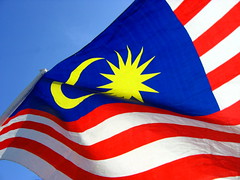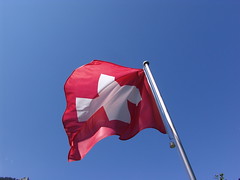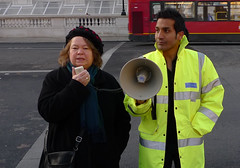By Paul Canning
The leader of Britain's opposition Liberal Democrats, Nick Clegg, has restated his party's support for change in the UK's attitude to LGBT asylum seekers.
From
an interview with The Independent:
On asylum seekers – an issue which is notoriously unpopular with the electorate – Mr Clegg was equally bullish, describing Britain’s asylum system as “the most inhumane, irrational, cruel systems imaginable”.
“It’s a moral stain on our collective consciousnesses,” he said. “The public debate has transformed asylum seekers into threats rather than human beings.”
He said Lib Dem policy would be that Britain should provide sanctuary to those fleeing persecution because of their sexual orientation: “It’s not just me that says this, it’s international law that says it.”
A party statement released alongside the interview summerised their policy as:
Guarantee any refugees genuinely fleeing a country because of persecution over their sexual orientation asylum in the UK.
Clegg has
previously spoken out against "the astonishing brutality and cruelty that has become a part of our asylum system". The party passed a resolution
'Government must stop sending gay and lesbian people to their deaths' at its 2008 conference.
Apart from the LibDems,
the UK Green party has good policy and has actively worked on the issue through their MEPs.
A general election in expected in the UK in May. Current polls suggest
a possible hung parliament which may put the LibDems in a position to influence and achieve much needed changes in LGBT asylum policy and practice.
The UK Labour government has consistently denied its discriminatory treatment of LGBT asylum seekers — despite the numerous appalling cases documented on
this website which led the widely respected NGO Human Rights Watch in 2008 to
name the Home Office to its 'Hall of Shame'. Time and again only support from activists and campaigning has saved people against a government wanting to throw them back to the wolves.
Among the LGBT asylum cases — all refused asylum by the government and only won after a long legal fight by the UK Lesbian and Gay Immigration group (UKGLIG), Outrage, Iraqi LGBT, the
Lesbian Community Project in Manchester and others including local communities, refugee groups and churches — are:

- Ugandans Prozzy Kazooma, who was marched for two miles naked through the streets, jailed, raped and tortured by police, Kizza Musinguzi, who was jailed for gay human rights work and subjected to four months of forced labour, water torture, beatings and rape, and John Bosco who was violently deported despite being personally targeted, with photos, by a homophobic Ugandan tabloid (Bosco was returned to the UK after a damning judicial decision and, despite Home Office efforts, subsequently given leave to remain). Another Ugandan was told by a judge in 2006 that women 'cannot be understood to be homosexual’.
- A Jamaican lesbian, who was told to go back to her homeland because she would be in no danger as she was over 40 and therefore no longer sexually attractive.
- Iraqi asylum seekers, still being told they can safely return to a country well documented to have active anti-LGBT death squads who kill gay men by filling their anuses with glue.
- Iranians Pegah Emambakhsh, whose partner was arrested, tortured and subsequently sentenced to death by stoning, and Mehdi Kazemi whose partner was also executed.
- An Algerian gay man who had been jailed for homosexuality. In prison, he was raped, beaten by inmates and guards and had his teeth knocked out.
Many others cases have been lost with people sent back to such violently homophobic countries as
Cameroon and Nigeria - where a police warrant on charges of homosexuality and a solicitor's letter stating that he was likely to be sentenced to death by stoning
wasn't enough to stop one gay man's deportation.
This record is news to the Labour Prime Minister, Gordon Brown, according to his statements in an interview this month with
Johann Hari for Attitude Magazine:
[Q] Speaking of violence against gay people - there are some refugees fleeing countries where gay people are imprisoned or killed who make it to Britain, and they seem to face a contradictory policy. Some who are given the right to remain, but others are told to go back to their home country, hide their sexuality, and hope for the best. Do you think that’s acceptable?
[A] Asylum law is incredibly difficult, and you can’t ever have a blanket inclusion or exclusion. Every asylum case is going to be dealt with on its merits. I don’t think any party will give you an absolutist commitment on this question. But obviously, our whole party has been built on the idea that where there is persecution, we’ve got to be prepared to help them.
[Q] So your view is, if someone is from a country where they will be killed for being gay, and they make it to Britain, they’ve got a right to stay?
[A] What I’m saying is that every case is treated as an individual case. And the people who come to this country who are able to show that they are seeking asylum because the persecution that they’ve suffered is a risk to their life… that is something that we as a nation have traditionally accepted.
Notably, Brown didn't respond to Haari's question on the government's policy of expecting LGBT asylum seekers to go back to the country where they are fleeing from and 'be discreet' about their sexuality.
Last year Phil Woolas, Minister of State for borders and immigration,
defended the 'be discreet' policy in an astonishing article promoting the presence of LGBT asylum seekers on the London Pride March as a Labour 'success story'. He said:
The Court of Appeal has found, in line with our policy that whether a gay claimant can reasonably be expected to tolerate behaving discreetly is something that must be considered on the individual merits of the case.
In a carefully worded response to this statement the UKGLIG said that
this policy was plainly discriminatory:
Phil Woolas claims that “a degree of discretion can be required in all sexual relationships, heterosexual as well as homosexual”, which implies that the measure of discretion required would be applied equally. This is clearly not the case and in practice LGBT persons would be forced to have to live a lie.
Moreover, this reference to discretion does not reflect the realities of most LGBT asylum claims: applicants simply want a life in which they can be who they are and/or have a relationship with their partner, without fearing death, violence, rape, prosecution, forced marriage or losing their livelihood or homes. Their claims are not about seeking the right to commit ‘public indecencies’. However, within the legal, social, cultural or religious framework in many of their home countries, an (open or secret) LGBT identity or same sex relationship is often, in and of itself, considered ‘indecent’.
Kerry Maskell, Project Coordinator of the
Lesbian Community Project in Manchester says:
We see people who have just arrived. They come in scared and quiet, afraid to talk to others or about themselves. We see them gain confidence and become vibrant wonderful people. Why would anyone want to take that away from them and put them back to being the people they were when they arrived?
A female asylum seeker from Saudi Arabia who Maskell has recently worked with has been told to go home and be discreet. She fled the country when her sister, who was also gay, disappeared from a safe house in her own country. She does not know what happened to her sister, only that she is dead.
Our group member fled the country with her two sons, who are not aware of her sexuality. She does not want to tell her sons or fully ‘come out’ until she knows that she can stay in the country as she fears, if people find out, she will be killed if she is sent home. She was told in court that, as she is not out in this country, she may as well go back to her own country and not be out there! She did win her case but the Home Office appealed against it and she now has to go through the whole process again.
Minister Woolas' attitude to people like Maskell defending LGBT asylum seekers was stated in
a 2008 interview where he derided a "vested interest" of 'NGOs and migration lawyers giving false hope and undermining the legal system'.
More evidence that Woolas is operating a discriminatory and homophobic regime was in a report published last year which found that lesbian asylum seekers
are not being protected by the UK Border Agency and their particular problems go unrecognised. Discrimination, abuse, harassment and violence, including rape, against them was common to the experience related by the women interviewed. They told of violence against them by people employed by the Government.
Last year UKLGIG said that:
Transmen are being detained in Yarl’s Wood – a female-only detention centre, gay men are forced to live with other detainees from their country of origin who often hold the same the homophobic views as the society they are escaping from.
Continuous allegations of physical assault and racial abuse by guards
forced former Home Secretary Jacqui Smith last year to ask Nuala O'Loan, the former Police Ombudsman of Northern Ireland, to conduct an investigation. But there has been no action by Labour on reports of the homophobic mistreatment of LGBT asylum seekers.
LGBT asylum activist Peter Tatchell has helped numerous people and has extensive experience of what
he calls 'Britain's homophobic asylum system'. He, more than anyone, knows how Labour has reneged on what few pledges have been squeezed out of it on LGBT asylum.
At the London LGBT Pride Rally in 2008 Labour Deputy Leader Harriet Harman was booed due to the government's treatment of Mehdi Kazemi.
Kazemi is a gay Iranian teenager who the Home Office wanted removed despite his young boyfriend having been executed. Kazemi was only saved from
a similar fate because of an international campaign leading to the conservative Dutch government (which operates a humane LGBT asylum policy) extracting concessions from then Home Secretary Jacqui Smith - Kazemi had fled the UK for the Netherlands.
Questioned after Kazemi eventually won 'leave to remain', Smith refused requests for a moratorium on the return of LGBT asylum seekers to Iran, claiming:
The evidence does not show a real risk of discovery of, or adverse action against, gay and lesbian people who are discreet about their sexual orientation.
Since 2000 at least
two Iranian gay asylum seekers have committed suicide rather than be returned.
29-year old
Israfil Shiri, who had fled Iran when the authorities there discovered he was gay, was one. He walked into the offices of Refugee Action in Manchester, doused himself in petrol and burned himself alive.
Says Peter Tatchell:
At his asylum hearing, the adjudicator turned down his application, citing ‘lack of evidence.’ Unable to find a lawyer willing to represent him, or to produce expert evidence on the persecution of gay people in Iran, he also lost his appeal.
Within days, the National Asylum Support Service ordered his eviction from the asylum hostel where he had been housed, turning him out in the street. Simultaneously, the government cut off his benefits. Banned from working, Shiri ended up homeless and destitute. Like many other asylum-seekers, he was forced to sleep on the streets and scrounge discarded food from rubbish bins.
His health rapidly deteriorated. But having no address, he could not register with a GP to get treatment.
The government has Shiri’s blood on its hands. It is enforcing an inhuman asylum system. The Home Office bears a large degree of responsibility for the suicide of this young gay man. It treated Shiri as a criminal, when in reality he was the victim of criminal abuse and neglect – both in Iran and in the UK.
As she stepped down from the London Pride stage after being booed, Tachell spoke with Harman. At a subsequent meeting with Harman and Minister Barbara Follett a "mechanism whereby [Tatchell] could report abuses and [they] would take action to put them right" was agreed. However this agreement fell apart at its first test when the two Ministers committed
what Tatchell describes as "a betrayal of the trust and commitment that I thought we had established" by refusing to make any representations in the case of the deported gay Azerbaijani asylum seeker
Babi Badalov.
As often happens, Badalov was called in to a meeting, seized and quickly put on a plane. He couldn't even pack a bag so was left on arrival in the Azerbaijani capital Baku with just the clothes he was wearing.
Once there he was forced into hiding with fellow artists (he has been exhibited in several countries) due to 'honour' threats of death from family members. His sister had warned him over the phone never to come to the country again.
He said:
I can’t tell you how horrible it is. If I die and there’s a funeral, nobody will come: the mullah won’t come, nobody will read the Koran. [The body of a gay man] is a dirty, foul body. It cannot be touched; it cannot be washed. It must be thrown into a pit, because it’s so shameful. This attitude still exists there.
When he was being put onto the plane Badalov reported being told by a Border Agent, "you make us sick, you're going back where you belong.” He is now in Paris after fleeing first to St Petersberg.
Tatchell is not the only one who has tried to lobby Labour.
UKLGIG
say that they have been asking for years for an LGBT Asylum Policy Instruction (API) which is used to guide UK Border Agency (UKBA) staff. Apart from sole case where asylum has been quickly granted,
the Nigerian gay Christian leader Davis Mac-Iyalla, the one and only breakthrough which this author is aware of is that the UKBA have invited UKLGIG to make presentations to case workers on LGBT asylum issues. However the charity puts this in context:
We are very pleased the UKBA have taken this step, but more in-depth training is very much needed and we are discussing this with the UKBA at the moment. In order to achieve fair decision making, caseworkers would require detailed knowledge and understanding of not only LGBT asylum issues, but of these issues in very specific cultural contexts.
One major reason that this 'understanding' hasn't been happening is because of what UKLGIG describe as the "quality and quantity of information on LGBT issues within the country of origin information (COI) prepared and used by the UKBA in their decision making". This despite
a 2006 commitment wrung from the Home Office that UKLGIG would have input directly into the process of information gathering as it relates to human rights abuses of sexual minorities globally. And again, following a 2008 independent review of COI which told UKBA what they should have already realised, rather than right this wrong themselves from their own vast resources, they looked instead to the small, under-resourced charity UKLGIG for help.
The debacle with Harman and Tatchell as well as the extensive concerns most prominently featured in the press by
the Mehdi Kazemi case led the party's LGBT activist organisation, LGBT Labour, to
pass a resolution at its AGM last year which highlighted problems they saw with the government's policy and practice. They proposed:
- That LGBT people should not be asked to prove their sexuality and that the Home Office and Borders and Immigration Agency respect the right of individuals to self define as LGBT.
- That the Borders and Immigration Agency employ specialist LGBT “case owners” who have received specific training in handling LGBT asylum cases.
- That the UK Government should not return people on the pretext that they will have to “hide” their sexuality on return to their home country.
As well as Labour LGBT, some Labour politicians have also expresssed concerns (though this has not included any of the party's prominent gay or lesbian MPs), which has undoubtedly helped specific cases. One Labour candidate has called for
'A fair deal for gay asylum seekers'. Yet in policy and practice terms almost nothing has changed for the better for LGBT refugees — and, as those working with LGBT refugees testify, much has
changed for the worse.
Despite PM Brown's claims, case after case has demonstrated Labour's indifference on the issue of LGBT refugees. Woolas and Smith's statements on the 'discretion' policy shows that discrimination lies at the heart of that indifference. The lack of any action on advice from the likes of UKGLIG shows a consistent failure of leadership on LGBT equality in the Home Office.
Although some opposition Conservative politicians have shown support for individual cases, this website is unaware of any statement or answer to a journalist's question from the Conservative leadership suggesting that they will review current Home Office/UK Border Agency policy and practice on LGBT asylum.
[UPDATE:
Cameron opposes 'be discrete' gay asylum policy?]
With only a few months to go before the election campaign, unless Labour can somehow do better than PM Brown's ignorant and bland statement "our whole party has been built on the idea that where there is persecution, we’ve got to be prepared to help", there is no reason to think that a Conservative government would do any worse.
For anyone concerned that the UK should and can do much better at providing sanctuary for LGBT fleeing persecution, execution and torture, on their policy, actions and in order to influence some real change this website's recommendation is
vote Green or LibDem.
 Image via Wikipedia
Image via Wikipedia









![Reblog this post [with Zemanta]](http://img.zemanta.com/reblog_e.png?x-id=e6dfc4e0-db47-4db1-885a-5944da2ebc13)

![Reblog this post [with Zemanta]](http://img.zemanta.com/reblog_e.png?x-id=d62046fa-9590-4a00-a109-64906038230e)

![Reblog this post [with Zemanta]](http://img.zemanta.com/reblog_e.png?x-id=1fe5448b-059c-40d5-9260-9931bc799529)





![Reblog this post [with Zemanta]](http://img.zemanta.com/reblog_e.png?x-id=faf60c69-a400-4319-aa70-2ae4acda0dcf)


![Reblog this post [with Zemanta]](http://img.zemanta.com/reblog_e.png?x-id=d0fcd77b-92dd-4917-bd22-301623f7c26d)



![Reblog this post [with Zemanta]](http://img.zemanta.com/reblog_e.png?x-id=3f84123e-c009-4f36-9fe4-e5263826a81a)





 Join our page
Join our page

